Justin Taylor's Blog, page 50
June 16, 2016
7 Crossway Books by Women So Far in 2016
With 7,000 women arriving in Indianapolis today for The Gospel Coalition Women’s Conference (you can see the schedule and livestream it), I thought I’d mention seven books by women (or co-authored/co-edited by women) that Crossway has published so far this year.
Gloria Furman, Missional Motherhood: The Everyday Ministry of Motherhood in the Grand Plan of God
“Gloria shows us that motherhood is more about God than about mothering, and that brings me great comfort as I parent four children and disciple other women around me. Missional Motherhood is about living, doing, teaching, and talking all about the Word of God and not just how we parent our children in our home. If you are a woman who loves Jesus, this is a book you should devour, regardless of whether or not you are a parent. I can’t wait to share this book with all the women in my life!”
—Jamie Ivey, host, The Happy Hour with Jamie Ivey podcast, JamieIvey.com
“Believing that our biblical theology as moms directs the way we view the mission of motherhood, Gloria takes us through a journey in both marveling at the greatness of God’s plan for redemption and embracing the opportunity to make an eternal impact from the everyday context of mothering. Missional Motherhood leads weary moms back to the gospel and reminds us that we are investing our lives in what is eternal.”
—Ruth Chou Simons, mother of six boys; artist, writer; owner, Gracelaced.com
Megan Hill, Praying Together: The Priority and Privilege of Prayer: In Our Homes, Communities, and Churches
“Megan Hill has given us a primer on prayer that is both useful and eloquent. Many of us, myself included, are prone to entertain an untruth about prayer: that it should always be easy and spontaneous, free of any hint of discipline or forethought. Megan empathetically and expressively lifts our eyes toward a higher vision, grounded in the truth of Scripture, of prayer as a delightful duty to be practiced, savored, and shared.”
—Jen Wilkin, author, Women of the Word; Bible study teacher
“Megan Hill is a wise and godly woman, a friend, and one of my favorite authors. She writes to move us to pray together in our homes, communities, and churches. She does three things in particular to help us to pray together in this book. She offers us encouragement, experience, and counsel—all richly biblical and theological. The chapter “Praying with the Church” is by itself worth the price of admission. The book is brief enough to be read in a sitting and deep enough to be savored for a semester. If you and your brothers and sisters in Christ pray together with more hope, delight, and expectancy because of reading it, I am sure that Megan will feel her aim is realized.”
—J. Ligon Duncan III, Chancellor and CEO, Reformed Theological Seminary, Jackson, Mississippi
“When Megan Hill prays, one feels the force of an entire life spent communing with the triune God. Now, Hill provides both the theology and practical guidance to usher others into a rich life of prayer among fellow Christians and in corporate worship. This book will remind you of how good and pleasant it is when God’s people dwell—and pray—together in unity.”
—Katelyn Beaty, Managing Editor, Christianity Today
 Jen Wilkin, None Like Him: 10 Ways God Is Different from Us (and Why That’s a Good Thing)
Jen Wilkin, None Like Him: 10 Ways God Is Different from Us (and Why That’s a Good Thing)
“In an upside-down world that has humanized God and deified man, Jen Wilkin brings us the best news imaginable: our God is infinitely greater, more powerful, more majestic, and more wonderful than we can possibly fathom. Jen calls us to lift our eyes upward, to earnestly contemplate his attributes, and to humbly acknowledge our own limits. As we do, our hearts will be filled with wonder and awe that such a God should stoop to save and love us.”
—Nancy DeMoss Wolgemuth, author; Radio Host, Revive Our Hearts
“Far beyond a Sunday school lesson listing the attributes of God, None Like Him evokes a sense of both familiarity and wonder around the characteristics of the Almighty we worship. This book puts us in our place, beneath the God of all and over all.”
—Kate Shellnutt, Associate Editor, Christianity Today; Editor, Her.meneutics
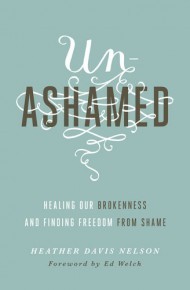 Heather Davis Nelson, Unashamed: Healing Our Brokenness and Finding Freedom from Shame
Heather Davis Nelson, Unashamed: Healing Our Brokenness and Finding Freedom from Shame
“Heather Davis Nelson has written a wonderful work on the topic of shame. She brilliantly weaves her own stories and those of others into the larger story of what God does with our shame. She fearlessly brings the light of Jesus to shine in the dark recesses of our souls as she helps to free us from the pain of shame.”
—Paul E. Miller, Executive Director, seeJesus; author, A Praying Life and A Loving Life
“Most of us can quickly point to a shame story from our past—that moment when we believed that we were shunnable, rejectable, and maybe even despicable. We, as heirs of God, so often live with a low level of misery caused by shame, even though Jesus came to set us free. In her insightful new book, Unashamed, Heather Davis Nelson explores the chains that bind us and then reminds us that we’re not just ex-sinners; we are saints who have been made new. Like a trusted friend, who also happens to be a therapist, Heather walks you to a place of freedom so you can be all Jesus intended you to be.”
—Susie Larson, national speaker; radio host, Live the Promise with Susie Larson; author, Your Beautiful Purpose
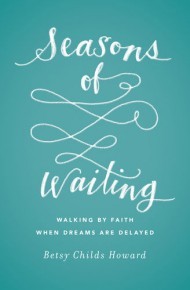 Betsy Childs Howard, Seasons of Waiting: Walking by Faith When Dreams Are Delayed
Betsy Childs Howard, Seasons of Waiting: Walking by Faith When Dreams Are Delayed
“The Bible and the history of the church are full of stories of God revealing incredible dreams and rescuing men and women in dramatic settings, such as Moses, Mary, John Wesley, and Pascal. But of course, it does not always happen that way—as Hannah, Elizabeth, Jeremiah, and countless other believers through the ages can testify. InSeasons of Waiting, Betsy Childs Howard offers hope for the weary traveler wrestling with this tension. Through her own story and others, she demonstrates how to wait well upon the faithful One who knows us and loves us and has a plan and purpose for each of us—and who often surprises us with gifts of which we may have never dreamed.”
—Ravi Zacharias, Founder and President, Ravi Zacharias International Ministries; author,Jesus Among Other Gods
“We are all in a season of waiting, even in the moments when we think we have arrived. Betsy Childs Howard speaks comforting truth to our anxious hearts, especially when we worry that our waiting will never end. What are you waiting for? Get a copy of this book and ask a friend to read with you!”
—Gloria Furman, pastor’s wife, Redeemer Church of Dubai; author, The Pastor’s Wife and Missional Motherhood
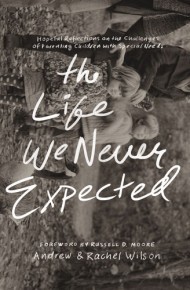 Andrew and Rachel Wilson, The Life We Never Expected: Hopeful Reflections on the Challenges of Parenting Children with Special Needs
Andrew and Rachel Wilson, The Life We Never Expected: Hopeful Reflections on the Challenges of Parenting Children with Special Needs
“The Life We Never Expected is an honest, confessional, and hopeful book. It doesn’t flinch from telling the whole truth about the trials of parenting special-needs children, and it reminds us of our need for the gospel every day. This isn’t a book that’s going to tell you to pull yourself up by your bootstraps and try harder. This is a book for those who are on the floor, weeping, because they need to know Jesus is with them.”
—Russell D. Moore, President, The Ethics & Religious Liberty Commission; author, Onward
“Weeping, worshiping, waiting, witnessing, and breathing. These are the constant rhythms of my life as a parent to a son with autism. These are also the rhythms of Andrew and Rachel Wilson’s life, beautifully and delicately illustrated in The Life We Never Expected. The Wilsons have managed to do what no other authors have—provide me with clear, promising hope as a special-needs parent and allow me the sacred practice of saying, ‘Me, too.’ Profoundly moving and deeply rooted in the love of Jesus, this book is exactly what I needed. It is a tremendous gift.”
—Nish Weiseth, speaker; author, Speak: How Your Story Can Change the World
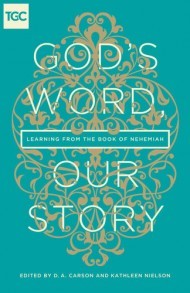 D.A. Carson and Kathleen Nielson,
God’s Word, Our Story: Learning from the Book of Nehemiah
D.A. Carson and Kathleen Nielson,
God’s Word, Our Story: Learning from the Book of Nehemiah
Foreword
Sandy Willson
Introduction: On Exposition
Kathleen Nielson
Taking Action in Light of God’s Word: Nehemiah 1-2
Kathy Keller
Laboring for a God Who Fights for Us: Nehemiah 3-4
Tim Keller
Fearing God in a Fallen World: Nehemiah 5-6
Paige Brown
Coming Together around God’s Word: Nehemiah 7-8
Nancy Guthrie
Responding to God according to His Word: Nehemiah 9-10
John Piper
Celebrating! A Moment of Joy in Jerusalem
Part I: Nehemiah 11:1-12:26
Carrie Sandom
Part II: Nehemiah 12:27-43
Jenny Salt
Part III: Nehemiah 12:44-47
Kathleen Nielson
7 Leaning Forward in the Dark: A Failed Reformation: Nehemiah 13
D. A. Carson
Conclusion: On Old Testament Narrative
Kathleen Nielson
Transgender and Intersex: Andrew Wilson on How Should the Church Interact in Love
This is a thoughtful, careful, and important talk from Andrew Wilson of Kings Church in Eastbourne in the UK:
Or audio:
Andrew is asking the question here: “How should we respond to people whose experience of their gender doesn’t fit with their biological sex? Or who have taken measures to change it? Or whose biological sex is unclear? What does love look like?”
He looks at Matthew 19:1-12. As the Pharisees seek to trap Jesus, he makes two crucial points relevant to this discussion: (1) Verse 4: “Have you not read that from the beginning he made them male and female?” The male/female binary and marriage are part of God’s good creation. (2) Verse 12: ”For there are eunuchs who have been so from birth, and there are eunuchs who have been made eunuchs by men, and there are eunuchs who have made themselves eunuchs for the sake of the kingdom of heaven.” The eunuchs were male, but Jesus seems to indicate that some people can lack appropriate genitals at birth)
So God made us male and female. But a few of us do not quite fit the categories—and were born that way. A culturally robust yet pastorally sensitive response to (1) Transgender (those whose experience of gender is different from their biological se), (2) Intersex (those whose biological sex is ambiguous) involves both of these insights, and (3) the activists, journalists, media, students, educators, progressives and Twitteratti who use Transgender people to try and destroy the male/female binary altogether.
When it comes to what love looks like, Andrew observes that our society seems to present only two options: (1) affirm that givenness of male and female, and insist everyone fits neatly into one; (2) deny the givenness of male and female, make a giant spectrum, and prioritize feelings over bodies. But Jesus presents a different way: (3) affirm emphatically that God made us male and female, that creation is good, that biological sex is good; and affirm emphatically that there are eunuchs—exceptions, whether from birth, disfigurement or self-inflicted changes—and that it is possible to be a eunuch “for the sake of the kingdom of heaven.”
Andrew closes by reminding us that all of us live with a dissonance between what we are and what we feel ourselves to be. Something can be true of us objectively, but we may feel it isn’t—and we need to keep hearing God say to us, “this is who you are.” The beauty of the gospel is that the Word and Work of Christ define us, not our feelings or experiences. And we long for the day when the dissonance will disappear altogether.
June 15, 2016
Why J.D. Greear Is Withdrawing His Name from Contention for the Presidency of the Southern Baptist Convention

J. D. Greear, pastor of The Summit Church in Raleigh-Durham, North Carolina, writes:
Yesterday the messengers of the Southern Baptist Convention voted for president of the SBC. And then, because it was too close to call, they voted again. That was too close, too. So this morning, we were all prepared to vote a third time.
That third vote won’t happen, because the third vote won’t be necessary. I’m withdrawing my name from contention, and pledging my full support to Pastor Steve Gaines.
Steve didn’t ask me to do this. This was my idea. He was incredibly gracious when we talked about this and prayed about this last night. And we both sought counsel from some of the godly men that encouraged us to be nominated in the first place. Together, we feel this is best for the SBC and best for the Kingdom.
Through this whole process, I’ve been praying for unity. I know that Pastor Steve has as well. But if we go to a third vote, and one of us wins by one half of one percent, it doesn’t matter which of us it is—it’s hard to see how that makes us a united body.
The task for those of you who voted for me is not to complain that things didn’t go our way. It’s to follow the example of our Savior, who came not to be served, but to serve. It’s time for us to step up and get involved, to keep pushing forward and engaging in the mission with those who have gone before us. It’s time to look at what unites us.
We exist as a convention of churches because we believe that we can do more together than we can do apart. What keeps us from splitting into a thousand different directions is one thing: our unity in the gospel of Jesus. We stand together because God saved us, and we want to see him save others—whether that’s in our neighborhoods or on the other side of the world.
I came to this convention with the conviction that the best days for the SBC were ahead of us. And I’ll be leaving this convention with the very same conviction. The greatest works of God aren’t in our past; they’re in our future. It’s time again for us to expect great things of God, and to attempt great things for God. So stand with me as we lift up the arms of our brother, and the next president of the SBC—Steve Gaines.
The original statement is found on his blog, which is currently overwhelmed with traffic. Therefore I’ve been given permission to post it here.
Congratulations to Steve Gaines, pastor of Bellevue Baptist Church in Cordova, Tennessee (a suburb of Memphis), who will become the 61st president of the Southern Baptist Convention—the largest Protestant body in the United States and the largest Baptist denomination in the world.
June 13, 2016
Bifrost Arts Helps the Church to Lament in Worship
I love the ministry of Bifrost Arts. One of their burdens is to help the church learn to lament like Jesus.
For example, here is a liturgy they have written:
Leader: The peace of the Lord be with you.
People: And also with you.
Leader: The Lord scatters His enemies; they are blown away as smoke, melted as wax before the fire. But the righteous will rejoice before Him. The Lord is Father to the fatherless and the defender of widows. He leads the prisoners out with singing.
People: Glory be to the Father, and to the Son, and the Holy Spirit. As it was in the beginning, is now and ever shall be – world without end. Amen.
Leader: Let us pray. For the sick and the dying, for all who grieve, for those lonely and forgotten, for those estranged from family, and for all who are in despair, we cry out for them “Be merciful, O Lord.” “My God, my God, why have you forsaken me? Why are you so far from saving me? O my God, I cry by day, but you do not answer, and by night, but I find no rest. Yet you are the one who brought me from the womb; you loved me when I was at my mother’s breasts, Be not far from me, for trouble is near, and there is no one who can help me. I am poured out like water on the ground.”
People: We pray to You, Lord Jesus, for comfort . . (silent prayer)
Leader: For the unborn, and for all Your children who will never draw their first breath, for young girls sold into slavery, for little boys delivered into violence, “a voice is heard in Ramah, lamentation and bitter weeping. Rachel is weeping for her children; she refuses to be comforted for her children, because they are no more. because infants and babes faint in the streets of the city. Even when we cry out, “Violence!’ we are not answered. How long, O Lord?”
People: We cry out to You, Lord Jesus, for justice. . . (silent prayer)
Leader: For the violence in our world, for the death of innocents in Syria, in Ukraine, in North Korea, in the streets of our own cities, and for every place in which Your people cry out, in which the stranger lives in fear of brutality, in which prisoners are abused, in which men plot against one another, we cry, “How long, O Lord?” “How desolate sits the city that once was full of people! How like a widow she has become, she that was great among the nations! She that was a princess among the provinces has become an object of scorn. For these things we weep; our eyes flow with tears. Comfort is far from us, for Your enemies have prevailed.”
People: We pray to You, Lord Jesus, for peace . . . (silent prayer)
Leader: Lord Jesus, in You all things were created—all things on heaven and on earth, all things visible and invisible, all thrones and powers and rulers and authorities. And You are reconciling all things to Yourself, making peace through the blood of Your cross. Renew us the zeal to see Your kingdom come on earth as it is in heaven. Make us ministers of Your reconciliation, we pray.
People: Amen.
(from Lamentations 1:1-6, Jeremiah 31:15, Job 19:7, Psalm 74:18-22, Psalm 22:1-8, Colossians 1)
Here is a video they have put together on lament in worship:
And here is one of their new songs, Rise Up:
You can get the whole album here.
June 7, 2016
The Weight of Glory: C. S. Lewis’s Remarkable (and Surprising) Sermon
Seventy-five years ago tomorrow C.S. Lewis ascended the pulpit at the University Church of St Mary the Virgin in Oxford and delivered “The Weight of Glory,” one of the most insightful sermons of the twentieth century.
Tomorrow morning at the new Evangelical History blog I will give a historical overview of that presentation—with photographs—and some of the influence that it has had as a subsequent publication. I look at who drove him to the sermon, the weather outside, who attended the sermon, how long it lasted, where it was published, and how it was popularized for Reformed evangelicals in particular.
I suspect that this celebrated address is more “sampled” than read straight through and understood in full. Many of us know the famous opening, where Lewis observes that we have settled for mud pies in the slum, ignorant of a holiday at the sea, and that we are far too easily pleased. Or we might know his section observing that we have never met a mere mortal. But what is the argument of the piece as a whole? Do we know that Lewis takes some surprising turns in this address, such as focusing more upon the glory we will receive from God than upon the glory that we will render to his name?
If you have to choose between reading this post and reading the original, by all means go back to Lewis! But if you could use some motivation or guidance, or simply want a substantial overview of the whole thing, I’ve tried my best to summarize the whole thing, tracing the various places Lewis takes us in this profoundly and edifying meditation.
The Highest Virtue? Love vs. Unselfishness
Almost all good men today would identify the highest virtue as unselfishness in contrast to love, which is how Christians of old would answer. But that means that something negative has replaced something positive, as unselfishness is foregoing good for ourselves, while love is securing good for others.
The Place of Desire
Unselfishness sees self-denial as an end in itself, such that it is bad to desire and hope for the enjoyment of our own good. Love sees self-denial as containing within it an appeal to desire, since it is good to desire and hope for the enjoyment of our own good.
The ethic of negating desire comes from Kant and the Stoics, whereas the ethic that appeals to the desire for our own good comes from the New Testament.
The former says our desires are too strong. The latter says our desires are too weak.
The problem is not that we have too much pleasure, but that we are far too easily pleased with that which is second best.
Objection: Desiring a Reward Makes One a Mercenary
To answer this objection, we have to recognize that there are three kinds of relationships between and action and a reward: (1) an unnatural reward (e.g., a man marrying for money); (2) a proper or natural reward (e.g., a man marrying for love—i.e., the reward is the activity itself in consummation); (3) a proper or natural reward that is not known by the actor until the reward is actually received (e.g., a boy learning Greek, where there is a gradual transition from drudgery to enjoyment, and only as he approaches the reward does he begin to enjoy it for its own sake). In this third category, the emerging desire itself is a kind of preliminary reward.
What Is the Christian Life Like?
The Christian life in the here and now fits best into the third category. Those who have gone to glory are in the first category, seeing that everlasting life is the consummation (proper/natural reward) of earthly discipleship. But those of us who have not yet attained this reality cannot know it in the same way, and cannot even begin to know it at all except by (a) continuing to obey and (b) finding the first reward of our obedience in our increasing power to desire the ultimate reward. As our desire increases, our fear of this being a mercenary desire eventually recedes to the point of being an absurdity.
The Object of Our Desire
What is the object of our reward? And what must be true about the connection between the desire and the reality?
If it’s true that we were made for heaven, then three things would also be true: (1) this desire for our proper place would already be within us; (2) this desire would not yet be attached to its true object; (3) this desire would appear to be the rival of its object (namely, heaven).
If it’s true that our real destiny is a good that transcends this temporal, finite world, then any other good on which our desire fixes must be in some degree fallacious, bearing at best only a symbolical relation to that which will truly satisfy.
Inconsolable Desire
To talk of this desire for our own far-off country almost feels like committing an indecency. It’s like ripping open an inconsolable secret in each of us. Our experience constantly suggests it, but it is a desire for something we have never actually experienced.
And our whole education is devoted to silencing this shy, persistent, inner voice, seeking to convince us that the earth is our home. But despite all efforts, we remain conscious of a desire which no natural happiness will satisfy.
Objection: The Presence of a Person’s Desire Doesn’t Prove That It Will Be Satisfied
It’s true: a man’s physical hunger does not prove that that man will get any bread; he may die of starvation on a raft in the Atlantic. But surely a man’s hunger does prove that he (1) comes of a race which repairs its body by eating and (2) inhabits a world where eatable substances exist.
Likewise, our desire for Paradise does not prove we will enjoy it. But it’s a good indication that such a thing exists and that some will enjoy it. A man may fall in love with a woman with no resulting marital union, but it would be odd if men fell in love with women in a sexless world.
Authoritative Imagery of Heaven
By definition heaven is outside our experience, but in order to be intelligible to us, all descriptions must come from within our experience. The Scriptural image comes to us with authority.
Five Types of Promises
There are basically five types of promises in Scripture: (1) we shall be with Christ; (2) we shall be like Christ; (3) we shall have glory; (4) we shall in some sense be fed or feasted or entertained; (5) we should have some sort of official ruling position in the universe.
Why Did God Give Us Any of These Promises Beyond the First One?
If “he who has God and everything else has no more than he who has God only,” why would Scripture induce us with promises beyond being with Christ?
Answer: The Nature of Symbols
The answer has to do with the nature of symbols, because any concept of being with Christ has to be communicated by earthly images of things from within our experience.
The variation of the promises does not mean that anything other than God will be our ultimate bliss. (1) Because God is more than a Person, and (2) lest we should imagine the joy of His presence too exclusively in terms of our present poor experience of personal love, with all its narrowness and strain and monotony, (3) therefore God supplies a dozen changing images, correcting and relieving each other.
The Promise of Glory
Salvation, both in the New Testament and in early Christian writings, is constantly associated with things like palms, crowns, white robes, thrones, and splendor (like the sun and stars). But for most of us, this kind of thing has little immediate appeal.
“Glory” suggests two things: (1) fame (which seems wicked), and (2) luminosity (which seems ridiculous). Does God want us to be better known than other people? Does he want us to be a kind of living light bulb?
1. Glory as Fame
Shockingly, Christian writers and theologians speak approvingly of glory as fame—not in the sense of approval from fellow creatures, but in receiving a good report or appreciation or approval by God.
This turns out to be a Scriptural idea: “Well done, thou good and faithful servant” (Matt. 12:21, 23). No one can enter heaven except as a child; and nothing is so obvious in a good and humble child as his great and undisguised pleasure in being praised. The humblest, most childlike, most creaturely of pleasures is pleasure of the inferior: a child before its father, a pupil before his teacher, a creature before its Creator.
Obviously this lawful pleasure of praise can quickly turn into the deadly poison of self-admiration. But can we not detect in our experience a very, very short moment when this satisfaction—of having pleased those whom we rightly love and fear—was pure? And if that is the case, we can contemplate the redeemed soul learning that he has pleased God, free from vanity and the miserable illusion that this is his own doing.
God Will Look Upon Us with Either Glory or Shame
In the end, that Face which is the delight or the terror of the universe must be turned upon each of us—either with the expression of conferring glory inexpressible or the expression of inflicting shame that can never be cured or disguised.
To please God . . . to be a real ingredient in the divine happiness . . . to be loved by God, not merely pitied, but delighted in as an artist delights in his work or a father in a son—all of this it seems impossible, a weight or burden of glory which our thoughts can hardly sustain. But so it is.
Note What Would Have Happened If We Had Ignored the Authoritative Scriptural Image
If we had stuck with our original vague notion of desire as a pointer to heaven and ignored the Scriptural teaching, we could not have seen the connection between this desire and the Christian promise. But having worked through the Scriptural promise, which at first seemed perplexing and repellent, the connection now seems perfectly clear. Christianity teaches us that glory will satisfy our original desire, revealing an element in our desire we hadn’t previously noticed.
The Connection between Glory and Desire
In the earlier discussion about our inconsolable longing, a crucial element was left out: we end up feeling like spectators instead of truly belonging to the world. We have tasted of it but not truly been accepted, welcomed, or taken into the dance. We feel like strangers having overheard something.
It’s at this point we see the relevance of God’s promise to our deepest desires, as glory means good report with God, acceptance by God, response, acknowledgment, and welcome into the heart of things.
Welcome or Banishment
Note how strange it is that the Apostle Paul promises those who love God not that they will “know God” (as we would expect) but rather that they would be “known by him” (1 Cor. 8:3). Jesus said that some who appear at last before the face of God will hear “I never knew you. Depart from me” (Matt. 7:23). In other words, in some mysterious way they will be banished from the presence of God who is everywhere and erased from the knowledge of him who knows all things. In contrast to those who are left on the outside—repelled, exiled, estranged, finally and unspeakably ignored—others will be called in, welcomed, received, acknowledged. To be summoned inside would be both glory and honor beyond what we deserve and the healing of our old ache.
2. Glory as Brightness, Splendor, and Luminosity
We now come to the second meaning of glory. The Bible says we are to shine as the sun (cf. Matt. 13:43) and to receive the morning star (Rev. 2:28).
Of course we can already view the morning star if we get up early enough in the morning to observe it. But we want more than to merely observe beauty—in an almost indescribable way, we want to be united with the beauty we see, to pass into it, to receive it into ourselves, to bathe in it, to become part of it.
Someday we will put on the glory of creation, or rather that greater glory of which Nature is only the first sketch.
Nature as Image or Symbol
This is not the heathen idea of being absorbed into Nature (after all, nature is mortal while we are immortal). But Nature is the image or symbol Scripture invites us to see. We are summoned to pass in through Nature, beyond her, into that splendor which she fitfully reflects. And in there, in beyond Nature, we shall eat of the tree of life (Rev. 2:7).
At present, if we are reborn in Christ, the spirit in us lives directly on God. The mind, however, and still more the body, receives life from God at a thousand removes—through our ancestors, through our food, through the elements.
What we now call “physical pleasures” are the faint, far-off results of those energies which God’s creative rapture implanted in matter when he made the worlds. Even so they are filtered, being too much for our present management.
What would it be to taste at the fountain-head that stream of which even these lower reaches prove so intoxicating?
But that is what lies before us. The whole man is to drink joy from the fountain of joy. As St. Augustine said, the rapture of the saved soul will “flow over” into the glorified body. In the light of our present specialized and depraved appetites we cannot imagine this violent torrent. We must not even try. But we must mention it, or we will have even more misleading thoughts (like what is saved is a mere ghost, or the risen body lives in numb insensibility). The body was made for the Lord, and these dismal fancies are wide of the mark.
The Practical Application of These Speculations
It may be possible for us to think too much of our own potential glory in the afterlife. However, it is impossible to think too often or too deeply about the potential glory of our neighbor.
The load, or weight, or burden of my neighbor’s glory should be laid daily on my back, a load so heavy that only humility can carry it, and the backs of the proud will be broken.
It is a serious thing to live in a society of possible gods and goddesses—to remember that the dullest and most uninteresting person you talk to may one day be a creature which, if you saw it now, you would be strongly tempted to worship, or else a horror and a corruption such as you now meet, if at all, only in a nightmare.
All day long we are, in some degree, helping each other to one or other of these destinations. It is in the light of these overwhelming possibilities, it is with the awe and the circumspection proper to them, that we should conduct all our dealings with one another, all friendships, all loves, all play, all politics.
No Ordinary People
There are no ordinary people. You have never talked to a mere mortal—they are immortal horrors or everlasting splendors.
This does not mean we must always be solemn.
The greatest form of merriment exists between people who take each other seriously, without flippancy, superiority, or presumption.
And our charity must be a real and costly love, with deep feeling for the sins in spite of which we love the sinner—no mere tolerance or indulgence which parodies love as flippancy parodies merriment.
Next to the Blessed Sacrament itself, your neighbor is the holiest object presented to your senses. If he is your Christian neighbor he is holy in almost the same way, for in him also Christ truly hides—the glorifier and the glorified, Glory himself, is truly hidden.
June 6, 2016
J. I. Packer on Something More Important Than Knowing God
As a follow-up to the post on Tozer vs. Lewis on the most important thing about us, here is a thought from J. I. Packer:
What matters supremely, therefore, is not, in the last analysis, the fact that I know God, but the larger fact which underlies it—the fact that he knows me. I am graven on the palms of his hands [Isa. 49:16]. I am never out of his mind. All my knowledge of him depends on his sustained initiative in knowing me. I know him because he first knew me, and continues to know me. He knows me as a friend, one who loves me; and there is no moment when his eye is off me, or his attention distracted from me, and no moment, therefore, when his care falters.
This is momentous knowledge. There is unspeakable comfort—the sort of comfort that energizes, be it said, not enervates—in knowing that God is constantly taking knowledge of me in love and watching over me for my good. There is tremendous relief in knowing that his love to me is utterly realistic, based at every point on prior knowledge of the worst about me, so that no discovery now can disillusion him about me, in the way I am so often disillusioned about myself, and quench his determination to bless me.
—Knowing God (Downers Grove, IL: InterVarsity Press, 1993), 41-42, emphasis added.
“But if anyone loves God, he is known by God.” (1 Cor. 8:3)
“On that day many will say to me, ‘Lord, Lord, did we not prophesy in your name, and cast out demons in your name, and do many mighty works in your name?’ And then will I declare to them, ‘I never knew you; depart from me, you workers of lawlessness.'” (Matt. 7:22-23)
“But now that you have come to know God, or rather to be known by God, how can you turn back again to the weak and worthless elementary principles of the world, whose slaves you want to be once more?” (Gal. 4:9)
“For now we see in a mirror dimly, but then face to face. Now I know in part; then I shall know fully, even as I have been fully known.” (1 Cor. 13:12)
June 5, 2016
Introducing the New Evangelical History Blog with Thomas Kidd
I am happy to announce a new blog venture at The Gospel Coalition entitled “Evangelical History,” which will be run by Thomas Kidd and me.
You can go over to the new blog and read Dr. Kidd’s introductory post. He writes:
What do we mean by “evangelical history”? Justin and I both have broad interests in the history of evangelical Christianity, and the history of Christianity, so those will be a major focus here. But we’re also interested in a Christian view of all kinds of history: political, military, social, and other topics.
Read the whole post to learn a bit more about Thomas Kidd.
If this new blog intersects with your interests, please consider subscribing to it. I’m excited about the sort of things we’ll be interacting with and presenting in the days ahead.
For those who are wondering, I plan to keep blogging at Between Two Worlds. I am most grateful for all who take the time to read it, and I hope it helps you in some small way.
I assume most folks who swing by Between Two Worlds have heard of Thomas Kidd by now, but if not, here’s what you should know: he is distinguished professor of history at Baylor University, is husband and a father of two boys, and one of the leading historians of religion in the colonial period in America. Over the past ten years, he has managed to produce on average a notable book each year (usually publishing with Yale University Press and Oxford University Press), and they all seem to be the best books on their subject.
He is currently working on a religious biography of Benjamin Franklin for Yale University Press, as well as a history of the United States for B&H.
Below are the other books he has published, with a blurb from a scholar. At the end, I’ve posted a video of the two of sitting down to talk about George Whitefield.
 The Protestant Interest: New England after Puritanism (Yale University Press, 2004).
The Protestant Interest: New England after Puritanism (Yale University Press, 2004).
“Sound in its scholarship, cogent in its arguments, and creative in its historical reconstruction, this book is a first-rate contribution to both American religious history and the early history of New England.”
—Mark Noll
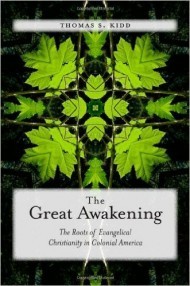 The Great Awakening: The Roots of Evangelical Christianity in Colonial America (Yale University Press, 2007) and The Great Awakening: A Brief History with Documents (Bedford Books, 2007).
The Great Awakening: The Roots of Evangelical Christianity in Colonial America (Yale University Press, 2007) and The Great Awakening: A Brief History with Documents (Bedford Books, 2007).
“Despite the prodigious attention to the ‘Great Awakening’ in eighteenth-century America, there has been, amazingly, no modern comprehensive account that looks at all regions from Nova Scotia to Georgia. The result is a highly fragmented series of vignettes and biographies with no overarching narrative. That void has now been more than filled by Thomas Kidd’s masterful analysis of the eighteenth-century revivals and the ‘evangelical’ movement they spawned. Thoroughly researched and beautifully written, this book is must reading not only for early American historians, but for anyone concerned to understand the origins of modern evangelicalism.”
—Harry S. Stout
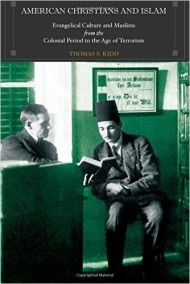 American Christians and Islam: Evangelical Culture and Muslims from the Colonial Period to the Age of Terrorism (Princeton University Press, 2008)
American Christians and Islam: Evangelical Culture and Muslims from the Colonial Period to the Age of Terrorism (Princeton University Press, 2008)
“Before Thomas Kidd’s magisterial work, American Christians and Islam, no scholar had traced the long and convoluted history of Muslim-Christian exchange in the American experience from colonial beginnings to the present. Kidd brings a deep understanding of both traditions to his analysis and brilliantly demonstrates how so many contemporary American denunciations of Islam—especially evangelical denunciations—have a rich history that goes all the way back to the Age of Exploration and the first English settlements.”
—Harry S. Stout
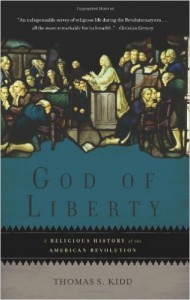 God of Liberty: A Religious History of the American Revolution (Basic Books, 2010)
God of Liberty: A Religious History of the American Revolution (Basic Books, 2010)
“Balanced without being bland, lucid in the telling, Thomas Kidd’s chronicle corrects the excesses both of those who overstate the degree to which America was founded as a ‘Christian nation’ and of those who seek to minimize the formative role of religion in the new nation’s character.”
—Christianity Today

Patrick Henry: First Among Patriots (Basic Books, 2011)
“Patrick Henry is well known for crying ‘Give me liberty or give me death’ at a crucial moment in the struggle for American independence. This well-researched biography shows that there was a great deal more to this strangely neglected founding father. Thomas Kidd is especially compelling on why Henry’s life-long devotion to liberty could never move him to free his own slaves and why that same devotion led him to oppose the United States Constitution of 1787. The book is accessible history at its best.”
—Mark Noll
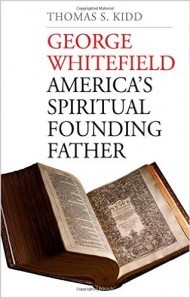
George Whitefield: America’s Spiritual Founding Father (Yale University Press, 2014)
“Thoroughly researched, and rooted in an exact knowledge of Whitefield’s times; critically perceptive while remaining appreciatively sympathetic; this is the best balanced and most illuminating chronicle of the Anglo-American Awakener’s career that has yet been produced.”
—J. I. Packer
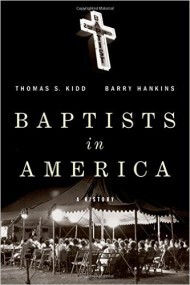
Baptists in America: A History, co-authored with Barry Hankins (Oxford University Press, 2015)
“Some books on Baptists in America sprinkle the reader with superficial simplicity, focusing on only one tribe or one aspect of the Baptist experience. Others drown the reader in historical narrative, but with no clear connection as to why non-Baptists ought to care. This book is different. This history offers a full immersion in the Baptist story, in every stream and fork of the Baptist river. This volume connects the Baptist experience to larger trends in American culture, politics, and theology in a way that informs both insiders and outsiders. This book is, without doubt, the definitive work on Baptists in America for this generation.”
—Russell D. Moore
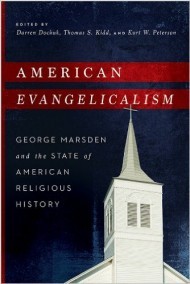 American Evangelicalism: George Marsden and the State of American Religious History, co-edited with Darren Dochuk and Kurt W. Peterson (Notre Dame University Press, 2015)
American Evangelicalism: George Marsden and the State of American Religious History, co-edited with Darren Dochuk and Kurt W. Peterson (Notre Dame University Press, 2015)
American Evangelicalism is a grandly conceived and skillfully executed festschrift in honor of George M. Marsden. The affection and regard for Marsden from his colleagues and former students shine through one essay after another. As a major historian of American evangelicalism whose temporal range spans from the colonial era well into the twenty-first century, Marsden very much deserves this impressive tribute.”
—Leigh Eric Schmidt
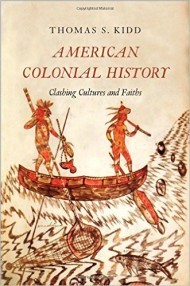 American Colonial History: Clashing Cultures and Faiths (Yale University Press, 2016)
American Colonial History: Clashing Cultures and Faiths (Yale University Press, 2016)
“A readable, balanced overview of colonial American history highlighting religion and conflict. Kidd’s narrative includes fascinating primary documents that allow us to hear early Americans speaking in their own voices.”
—Catherine Brekus
June 4, 2016
Tozer vs. Lewis: What’s the Most Important Thing about Us?
A. W. Tozer:
What comes into our minds when we think about God is the most important thing about us.
The history of mankind will probably show that no people has ever risen above its religion, and man’s spiritual history will positively demonstrate that no religion has ever been greater than its idea of God. Worship is pure or base as the worshiper entertains high or low thoughts of God.
For this reason the gravest question before the Church is always God Himself, and the most portentous fact about any man is not what he at a given time may say or do, but what he in his deep heart conceives God to be like.
We tend by a secret law of the soul to move toward our mental image of God. This is true not only of the individual Christian, but of the company of Christians that composes the Church. Always the most revealing thing about the Church is her idea of God.
—A.W. Tozer, The Knowledge of the Holy (New York: HarperCollins, 1978), 1.
C. S Lewis:
I read in a periodical the other day that the fundamental thing is how we think of God.
By God Himself, it is not! How God thinks of us is not only more important, but infinitely more important. Indeed, how we think of Him is of no importance except in so far as it is related to how He thinks of us.
It is written that we shall “stand before” Him, shall appear, shall be inspected. The promise of glory is the promise, almost incredible and only possible by the work of Christ, that some of us, that any of us who really chooses, shall actually survive that examination, shall find approval, shall please God. To please God . . . to be a real ingredient in the divine happiness . . . to be loved by God, not merely pitied, but delighted in as an artist delights in his work or a father in a son—it seems impossible, a weight or burden of glory which our thoughts can hardly sustain. But so it is.
—C. S. Lewis, “The Weight of Glory” (1941)
June 3, 2016
A New Two-Volume Christ-Centered Biblical-Theological Introduction to the Old and New Testaments
Crossway has just published two 600-page volumes, years in the making, that should find a place on every pastor’s bookshelf:
A Biblical-Theological Introduction to the Old Testament: The Gospel Promised , edited by Miles Van Pelt, and
A Biblical-Theological Introduction to the New Testament: The Gospel Realized , edited by Michael Kruger.
In the introduction to his edited volume, Mike Kruger explains that while the NT introduction has similarities to those that have come before it, it has several distinctives:
It is theological.
It is redemptive-historical.
It is Reformed.
It is multiauthored.
It is pastoral.
I’ll highlight just one of these, his explanation of the book’s accessibility:
Generally speaking, New Testament introductions have tended to focus primarily on historical-critical issues related to the background of each of the twenty-seven books. While many introductions spend considerable time engaging in highly technical discussions about dating, authorship, and textual history, they often devote comparably little space to the theological, doctrinal, and practical aspects of these books. Now, it should be noted that these background issue are very important in their own right; and the authors of this volume have dealt with many of them in other places (e.g., see Charles Hill’s highly technical monograph on the origins of the Johannine corpus). However, for the average Bible study leader or local pastor, such discussions are not always their primary need as they prepare their lessons or sermons. Sure, they need to be introduced to the major background issues, but not in such a way that they get mired in overly technical discussions. For these reasons, the present volume has attempted to make the discussion of background issues more streamlined and more accessible. By way of example, some of the more technical discussions that normally appear at the beginning of New Testament introductions—discussions related to the New Testament text, the New Testament canon, and the synoptic problem—now appear at the end of this one. Thus, these important appendixes are available if and when they are needed, but they are not, if you will, the lead story. And they are targeted not to the scholar but to the average pastor or student.
Here are some comments on the Old Testament volume:
“For expository preachers and teachers of the Bible, this is truly a gold mine. Present and past members of the Reformed Theological Seminary faculty have produced a volume that is long overdue. Sound biblical-theological treatments of each book of the Old Testament, linked with good historical and literary comments, all conclude by pointing to the fulfillment of the texts in the person and work of Jesus. With this volume, no preacher should ever feel that preaching Christ from the Old Testament is too hard or too speculative.”
Graeme Goldsworthy, Former Lecturer in Old Testament, Biblical Theology, and Hermeneutics, Moore Theological College
“In this volume, a number of capable biblical scholars faithfully explore the Old Testament writings with sensitivity and sensibility. They do an admirable job not simply in describing the main themes and theology of each book but also in artfully showing that the Old Testament has a covenantal framework, a kingdom perspective, and Christ at its center. In brief, this is a superb volume, which provides an understandable and informative overview of the Old Testament. A great antidote to an embarrassing ignorance of the Old Testament by Christians.”
Michael F. Bird, Lecturer in Theology, Ridley College, Melbourne, Australia; author, Evangelical Theology
And here are some comments on the New Testament volume:
“Seminary-level New Testament introductions are plentiful. But this one provides what others do not: a consistent hermeneutical orientation as articulated by a top-tier roster of nine different scholars associated with Reformed Theological Seminary throughout its history. In addition to chapters covering all the New Testament books, valuable appendices treat canon, text, the synoptic problem, and more. Addressing both spiritual and academic issues with a view to pastoral equipping and biblical exposition, this wide-ranging compendium will benefit readers in both classroom and personal settings.”
Robert W. Yarbrough, Professor of New Testament, Covenant Theological Seminary
“With the right mix of academic integrity and purposeful accessibility, this New Testament introduction will serve time-crunched pastors, ministry-minded students, and church members looking to better understand their Bibles. What makes this new volume unique is the emphasis on examining the theological themes in each book of the New Testament, rather than focusing on arcane debates prompted by liberal scholarship. The result is an insightful and impressive resource, one I will use in my own studies and often recommend to others.”
Kevin DeYoung, Senior Pastor, University Reformed Church, East Lansing, Michigan
“While introductions to the New Testament abound, this volume is a rare gem. It admirably combines depth of scholarship and theological exegesis within a biblical-theological framework—all couched in highly readable prose, offered for the sake of the church. It will no doubt instruct and edify. Well done.”
Constantine R. Campbell, Associate Professor of New Testament, Trinity Evangelical Divinity School
If you go here, you can read sample material from the OT volume, including Ligon Duncan’s foreword, the table of contents with contributors, Miles Van Pelt’s preface and introduction, and John Currid’s whole chapter on Genesis.
If you go here, you can read sample material from the NT volume, including Ligon Duncan’s foreword, the table of contents with contributors, Michael Kruger’s introduction, and Reggie Kidd’s whole chapter on Matthew.
June 1, 2016
Rob Bell Revisited: 5 Years Later

Relevant Magazine recently ran a piece entitled, “Rob Bell: Through Hell and Back.” In preparation for the piece, they asked me a few questions. The piece fairly represents my view, for which I am grateful.
To provide some additional context for my comments, I thought it might help to print the answers I sent them in full. I’ve re-phrased their questions.
What caused this to become such an uprising?
The temptation is to take a mono-causal approach, as if there’s one thing that created the firestorm.
But as with virtually anything that becomes A Very Big Deal, the causes are varied and complex.
It’s only when the conditions are right and the various elements combine that the explosion can occur.
There are probably more factors at play than I could enumerate, but here are several that come to mind:
(1) Bell had a charismatic persona and a popular reputation (especially among younger evangelicals) for creative envelope-pushing without crossing over into anything heterodox.
(2) Many older evangelicals had a vague suspicion that he was a good communicator who was increasingly untethered from sound doctrine and careful exegetical theology, such that his trajectory looked sketchy and worrisome.
So I think these two combined as background for why when Bell seemed to be coming out with a more definitive move away from orthodoxy, the reaction was bound to be loud—both from his detractors and from his defenders.
Add to that at least two other factors:
(3) The mediums at play—social media responding to a book trailer video—allowed for rapid reaction and instant analysis (including my blog post wondering if he was going to reveal himself to be a universalist and John Piper’s famous “Farewell Rob Bell” tweet that linked to my post).

(4) The theological questions being asked were significant and troubling.
Popular Evangelicalism has a history, especially in the latter half of the twentieth century, of being anti-intellectual—chasing after fads and riding every wind and wave of doctrine.
But it at least gave nominal attention to the basic ideas of the Christian gospel:
a good and holy God sent his Son to die for our sins, taking the punishment we deserve;
all of us are sinners and so our good works or good reputation are never enough before a holy God;
if we would trust him and him alone, we would be rescued for wrath and saved for heaven not hell.
Well along comes Rob Bell and says that maybe none of that is really true.
In fact, maybe this whole story is not even biblical, not even good news.
Maybe this false story, Bell wondered, is “an endless list of absurdities and inconsistencies.”
Maybe this God of the traditional gospel is not even good—cannot even be trusted. Maybe this gospel is not good news but terribly depressing news.
Maybe this is the reason so many people are rejecting Christianity.
Maybe people like Gandhi who rejected Jesus don’t go to hell after all. (I still wonder, by the way, if Bell has ever done any historical research on what an immoral and abusive man Gandhi was!)
Even more than sounding like a hipster universalist, Bell sounded like he was on his way out of orthodox Christianity altogether.
That, by the way, was what Piper was recognizing and lamenting, rather than offering a “flippant” or mocking dismissal, as some have alleged. Anyone who thinks that it was done with malice or glee, rather than pastoral concern and deep sadness, doesn’t know John Piper.
Looking back, was the controversy merited?
If anything, I think the initial concerns were understated.
Bell defenders were saying, “But you haven’t even read the book!” (In fact, I was able to read a pre-pub copy of the book during the week after the controversy broke.) But the actual book itself vindicated the dismay that so many of us felt. Kevin DeYoung’s thorough review of the book showed just how problematic the book turned out to be.
How did all of this change Rob Bell’s reputation?
I think it made it harder for a lot of younger evangelicals—who cared about biblical theology and sound doctrine but admired Bell’s creativity and insights—to defend him. There has been a resurgence of theological training among young evangelicals over the past few decades, and I think most people who have carefully studied Scripture and theology and church history—whether they have a seminary education or not—were able to see that Bell was seriously out of his depth. A lot of folks saw that he was on a certain trajectory and that he was now happy to leave evangelicalism in the rear-view mirror. His decision to leave his church and literally sign on to the Oprahfication of spirituality has only solidified and deepened those concerns.
For reference, here is a transcript of the video that started all of this:
“Several years ago we had an art show at our church and people brought in all kinds of sculptures and paintings, and they put them on display. And there was this one piece that had a quote from Ghandi in it. And lots of people found this piece compelling. They’d stop and sort of stare at it and take it in and reflect on it. But not everyone found it that compelling. Somewhere in the course of the art show, somebody attached a handwritten note to the piece and on the note they had written: ‘Reality check. He’s in hell!’ Ghandi’s in hell? He is? And someone knows this for sure? And felt the need to let the rest of us know? Will only a few select people make it to heaven? And will billions and billions of people burn forever in hell? And if that’s the case — how do you become one of the few? Is it what you believe, or what you say, or what you do, or who you know, or something that happens in your heart? Or do you need to be initiated or baptized or take a class or converted or being born again? How does one become one of these ‘few’? And then there is the question behind the questions. The real question: What is God like? Because millions and millions of people were taught that the primary message, the center of the gospel of Jesus, is that God is going to send you to hell unless you believe in Jesus. And so what gets suddenly sort of caught and taught is that Jesus rescues you from God. But what kind of God is that that we would need to be rescued from this God? How could that God ever be good? How could that God ever be trusted? And how could that ever be ‘good news’? This is why lots of people want nothing to do with the Christian faith. They see it as an endless list of absurdities and inconsistencies and they say, ‘Why would I ever want to be a part of that?’ See, what we believe about heaven and hell is incredibly important because it exposes what we believe about who God is and what God is like. What you discover in the Bible is so surprising unexpectantly beautiful that whatever we’ve been told or taught, the Good News is actually better than that! Better than we could ever imagine. The Good News is that love wins.”
Justin Taylor's Blog
- Justin Taylor's profile
- 44 followers






